
Alchemy is an ancient branch of natural philosophy, a philosophical and protoscientific tradition that was historically practiced in China, India, the Muslim world, and Europe. In its Western form, alchemy is first attested in a number of pseudepigraphical texts written in Greco-Roman Egypt during the first few centuries AD.

Ramon Llull was a philosopher, theologian, poet, missionary, and Christian apologist from the Kingdom of Majorca.
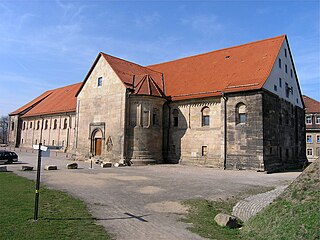
Basil Valentine is the Anglicised version of the name Basilius Valentinus, ostensibly a 15th-century alchemist, possibly Canon of the Benedictine Priory of Saint Peter in Erfurt, Germany but more likely a pseudonym used by one or several 16th-century German authors.
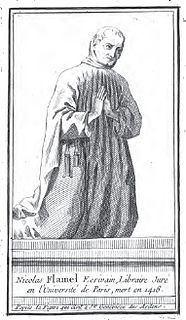
Nicolas Flamel was a French scribe and manuscript-seller. After his death, Flamel developed a reputation as an alchemist believed to have created and discovered the philosopher's stone and to have thereby achieved immortality. These legendary accounts first appeared in the 17th century.
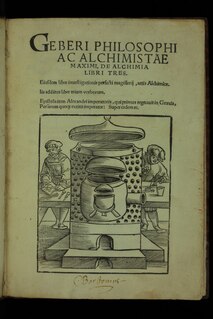
Pseudo-Geber refers to a corpus of Latin alchemical writings dating to the late 13th and early 14th centuries, attributed to Geber, an early alchemist of the Islamic Golden Age. The most important work of the Latin pseudo-Geber corpus is Summa perfectionis magisterii, likely written slightly before 1310, whose actual author has been tentatively identified as Paul of Taranto. The work was influential in the domain of alchemy and metallurgy in late medieval Europe.

Michael Maier was a German physician and counsellor to Rudolf II Habsburg. He was a learned alchemist, epigramist, and amateur composer.
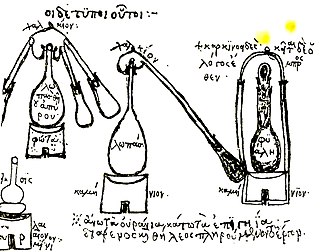
Zosimos of Panopolis was a Greco-Egyptian alchemist and Gnostic mystic who lived at the end of the 3rd and beginning of the 4th century AD. He was born in Panopolis, and flourished ca. 300. He wrote the oldest known books on alchemy, which he called "Cheirokmeta," using the Greek word for "things made by hand." Pieces of this work survive in the original Greek language and in translations into Syriac or Arabic. He is one of about 40 authors represented in a compendium of alchemical writings that was probably put together in Constantinople in the 7th or 8th century AD, copies of which exist in manuscripts in Venice and Paris. Stephen of Alexandria is another.

The Alexander Romance is an account of the life and exploits of Alexander the Great. Although constructed around a historical core, the romance is largely fictional. It was widely copied and translated, accruing legends and fantastical elements at different stages. The original version was composed in the Greek language before 338 AD, when a Latin translation was made. Several late manuscripts attribute the work to Alexander's court historian Callisthenes, but the historical person died before Alexander and could not have written a full account of his life. The unknown author is still sometimes known as Pseudo-Callisthenes.

Lullism is a term for the later philosophical and theological currents related to the philosophy of Ramon Llull. It also refers to the project of editing and disseminating Llull's works. The earliest centers of Lullism were in fourteenth-century France, Mallorca, and Italy.
Petrus Bonus was a late medieval alchemist. He is best known for his Precious Pearl or Precious New Pearl, an influential alchemical text composed sometime between 1330 and 1339. He was said to have been a physician at Ferrara in Italy, causing him to sometimes be known as Petrus Bonus of Ferrara or as Petrus Bonus the Lombard. An Introduction to the Divine Art is also attributed to him but was printed much later, in 1572.
John Dastin (c.1293-c.1386) was an English alchemist of the fourteenth century. Little is known of his life beyond the texts which are attributed to him. Dastin is known for correspondence with Pope John XXII and Cardinal Napoleone Orsini in defense of alchemical practice, dated to 1320.
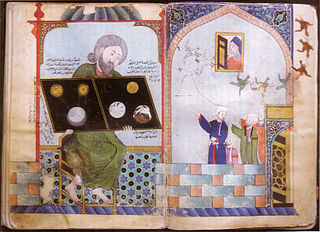
Muḥammad ibn Umayl al-Tamīmī, known in Latin as Senior Zadith, was an Egyptian alchemist who lived from c. 900 to c. 960 AD.

The rue de Montmorency is a street in the historic Le Marais quarter of Paris, part of the city's 3rd arrondissement. It runs from the rue du Temple to the rue Saint-Martin.

Theatrum Chemicum is a compendium of early alchemical writings published in six volumes over the course of six decades. The first three volumes were published in 1602, while the final sixth volume was published in its entirety in 1661. Theatrum Chemicum remains the most comprehensive collective work on the subject of alchemy ever published in the Western world.
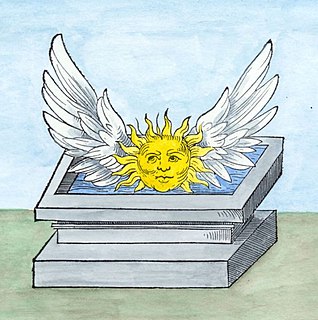
The Rosary of the Philosophers is a 16th-century alchemical treatise. It was published in 1550 as part II of De Alchimia Opuscula complura veterum philosophorum (Frankfurt). The term rosary in the title is unrelated to the Catholic prayer beads; it refers to a "rose garden", metaphoric of an anthology or collection of wise sayings.
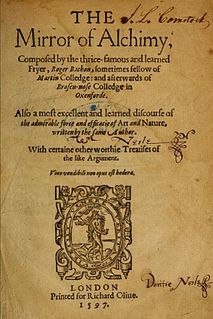
The Mirror of Alchimy is a short alchemical manual, known in Latin as Speculum Alchemiae. Translated in 1597, it was only the second alchemical text printed in the English language. Long ascribed to Roger Bacon (1214-1294), the work is more likely the product of an anonymous author who wrote between the thirteenth and the fifteenth centuries.
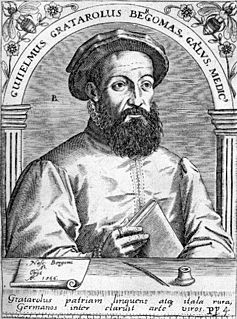
Guglielmo Gratarolo or Grataroli or Guilelmus Gratarolus was an Italian doctor and alchemist.
De Alchemia is an early collection of alchemical writings first published by Johannes Petreius in Nuremberg in 1541. A second edition was published in Frankfurt in 1550 by the printer Cyriacus Jacobus.

Auguste Vallet de Viriville, after 1858 known as Auguste Vallet was a French archivist and historian.
Solomon or Salomon Trismosin was a legendary Renaissance alchemist, claimed possessor of the philosopher's stone and teacher of Paracelsus. He is best known as the author of the alchemical works Splendor Solis and Aureum Vellus.
















